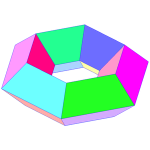
I guess you all know what a WikiWikiWeb (short: wiki) is, it's a website where you can easily add new pages and modify existing ones. MathOverflow is some kind of hybrid between Q&A and a wiki, since users with enough reputation can edit other people's questions and answers. MathOverflow made the Markdown syntax very popular, and people got used to using LaTeX online. Some of my readers surely know the nLab, a collaborative wiki on n-categorical math(ematical physics) and stuff. The nLab runs on a software called Instiki, which is a wiki written in Ruby (an intepreted language similar to Python, and somewhat similar to Lisp, Perl and JavaScript; which is often used for web applications like wikis). The good thing about Instiki is that it supports editing pages in Markdown syntax with embedded LaTeX, so it is able to support your personal knowledge management needs. In addition, Instiki is small (thus not many bugs are to be expected), fast and the code is quite readable; something I wouldn't say about MediaWiki, the software behind Wikipedia.
In this post, I will tell you how to run your own wiki like the nLab. [UPDATED 2013-01-07; easier fix]
Continue reading «Get your own LaTeX-enabled wiki in the cloud with Instiki on Heroku»





